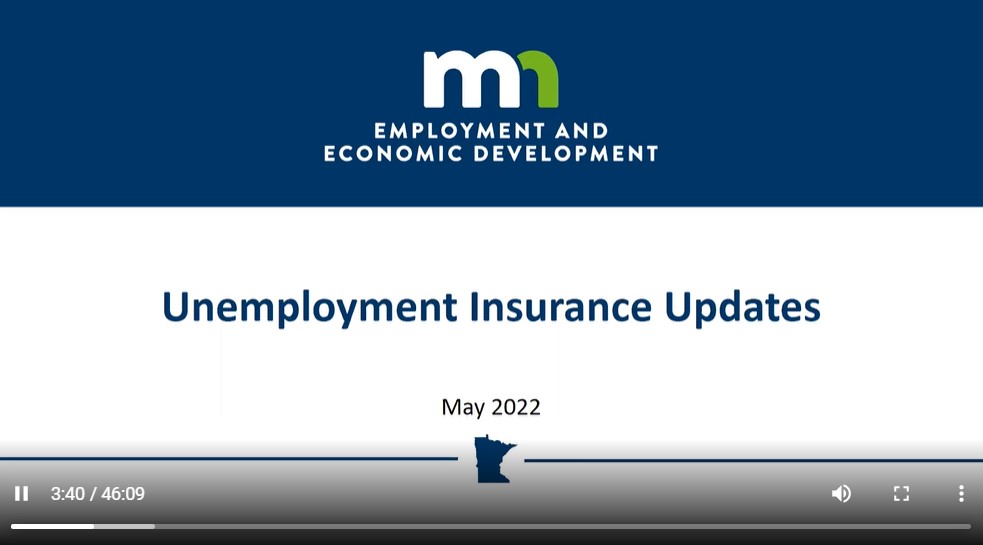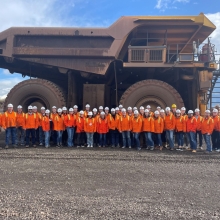Details on recouping UI taxes; frontline worker bonuses
Details from DEED on recouping UI taxes
Updated May 9, 2022. Click here for the latest from DEED.
A UI Trust Fund fix was recently enacted and the new law impacts every employer in the state. Unfortunately, this change happened after employers were billed under the old tax rates and many businesses have already paid these higher taxes. On May 9, the Chamber hosted a webinar featuring DEED Commissioner Steve Grove on employers' UI tax bills, as well as Commissioner Roslyn Robertson of the Minnesota Department of Labor and Industry on frontline worker bonuses. Per DEED:
- On Saturday, May 7, DEED recalculated the amount of 1st quarter 2022 taxes for about 113,000 employers.
- Because most employers had already reported their wage detail and made their first quarter 2022 tax payments, the recalculation created credits on their UI accounts.
- Credits can be left on your UI account or you can request a refund. Refunds will take at least a couple months to fully process.
- Visit https://uimn.org/employers/index.jsp to login and view your credit and click here for FAQ on the UI tax changes.

Details from Minnesota Department of Labor and Industry on frontline worker bonuses
Updated June 7, 2022. Click here for the latest from DLI.
Per DLI on frontline worker bonuses:
Applications and assistance
The Frontline Worker Pay application will be open June 8 through July 22, 2022. Eligible workers will have 45 days to apply for Frontline Worker Pay. Applicant support will be available to assist applicants in multiple languages.
Remember, you don't have to be first in line when the application opens. The application will be open for 45 days and the funds are not first come, first served. The money set aside for this program will be split equally among all approved applicants after the 45-day application period, the 15-day appeals period and the appeals review period.
Information for employers
The Frontline Worker Pay law requires that employers in a frontline sector provide notice by June 23, 2022, in a form approved by the commissioner of the Department of Labor and Industry, advising all current workers who may be eligible for Frontline Worker Pay of the assistance potentially available to them and how to apply for benefits. Download the employer notice here.
Appeals
Those whose applications are denied may appeal the decision within 15 days of notice of denial.
Payments
After processing and verification of the applications, as well as a 15-day period for denied applicants to contest those decisions, the final list of eligible applicants will be determined. Each eligible applicant will be provided with an equal payment, not to exceed $1,500. All applications will move through the process at the same time and payments will be forwarded for processing together.
To be eligible for Frontline Worker Pay, the applicant:
- must have been employed at least 120 hours in Minnesota in one or more frontline sectors between March 15, 2020, and June 30, 2021.
- for the hours worked during this time period the applicant –
- was not able to telework due to the nature of the individual's work and
- worked in close proximity to people outside of the individual's household;
- must meet the income requirements for at least one year between Dec. 31, 2019, and Jan. 1, 2022 –
- workers with direct COVID-19 patient care responsibilities must have had an adjusted gross income of less than $350,000 for married taxpayers filing jointly, or less than $175,000 for other filers and
- for workers in occupations without direct COVID-19 patient care responsibilities, the adjusted gross income limit is $185,000 for married taxpayers filing jointly, or $85,000 for other filers; and
- must not have received an unemployment insurance benefit payment for more than 20 weeks on a cumulative basis for weeks between March 15, 2020, and June 26, 2021 (Minnesota Statutes, section 268.085, subdivision 1, clause 6).
The frontline sectors include:
- long-term care and home care;
- health care;
- emergency responders;
- public health, social service, and regulatory service;
- courts and corrections;
- child care;
- schools, including charter schools, state schools and higher education;
- food service, including production, processing, preparation, sale and delivery;
- retail, including sales, fulfillment, distribution and delivery;
- temporary shelters and hotels;
- building services, including maintenance, janitorial and security;
- public transit;
- ground and air transportation services;
- manufacturing; and
- vocational rehabilitation.


